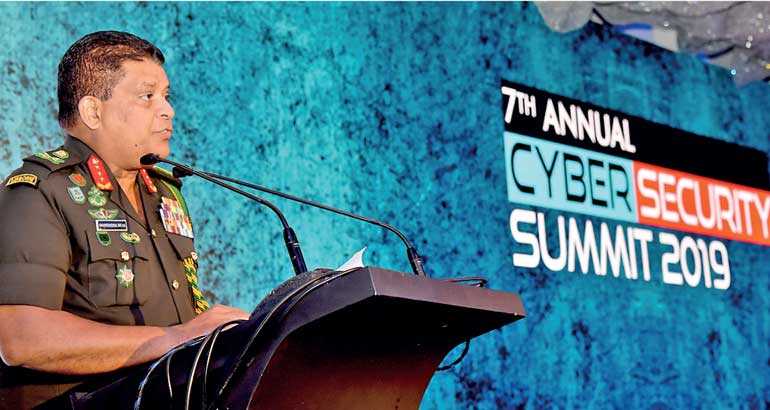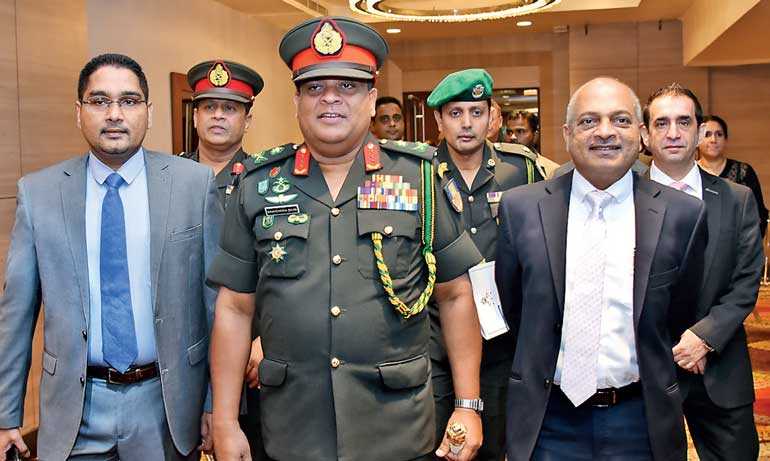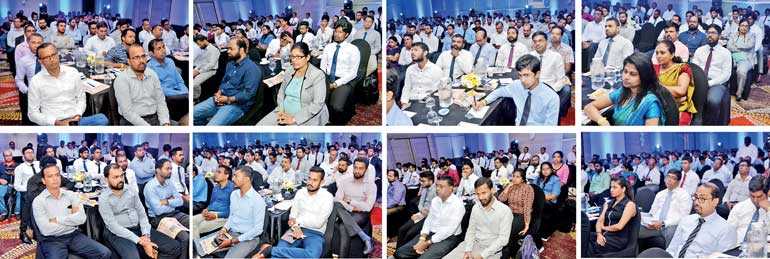Friday Feb 27, 2026
Friday Feb 27, 2026
Friday, 27 September 2019 00:00 - - {{hitsCtrl.values.hits}}



Army Commander Lt. Gen. Shavendra Silva on Tuesday emphasised that cybersecurity readiness of businesses is a strong part of the cybersecurity of a nation.
“Cybersecurity readiness is vital not only for the State, but also to the businesses that operate within it, whether they are privately owned, publicly owned or State-owned,” Silva told the audience gathered at the inauguration of the Daily FT-CICRA 7th Annual Cybersecurity Summit at the Cinnamon Grand.
“The businesses are the backbone of the economy of any state. Hence, cybersecurity readiness of the businesses is a strong part of the cybersecurity of a nation. This applies not only to larger business conglomerates, but also to small and mid-market businesses,” the Army Commander emphasised.
It was pointed out that the challenge of cybersecurity must be addressed to reap the full dividends of future digital economy. “We have moved into an era of increasingly complex cyber threats. Cyber threats affect every facet of our increasingly digital lives. But in the economic domain, cyber-attacks have been responsible for significant economic losses too,” Silva added.
Silva also emphasised that Sri Lanka needs to focus on increasing the number of skilled cybersecurity professionals the country is producing, to protect the country’s cyber sphere from cyber-attackers and put a stop to cybercrimes, which are on the rise.
The Army Commander mentioned that it is of utmost importance for the country to build this talent pool, as growing threats from social media platforms and increasing exploitation of Sri Lanka’s cyberspace have become severe security concerns, which are disrupting both social and economic aspects of the country.
“Over the last few years, we have identified that increasing exploitations of Sri Lanka’s cyberspace and growing diversified threats, which emanate from social media, are becoming major security concerns of the country. There have been many instances where our national cyber infrastructure was exploited. Attacks on our cyber platforms would cause severe economic constraints. Moreover, social media is being used to change perceptions and incite different ideologies harmful for the wellbeing of society.”
“Under these developments, it is important to note that Sri Lanka as a nation-state needs more and more cybersecurity professionals who are skilled with the knowledge to counter rising cyber threats, irrespective of them being employed by the Government or the private sector,” said Silva.
With internet penetration and computer literacy rising in Sri Lanka, Silva pointed out that citizens are more vulnerable now to misinformation. In that context, Silva called for different initiatives to be implemented to raise awareness among Sri Lankans about various cyber-attacks, and defend themselves against those threats. He also spoke about forming public-private partnerships (PPPs)—both locally and internationally—to create a robust cybersecurity domain. “Different people and groups will try to propagate misinformation and destabilise social cohesion. Misguided youths sitting in front of social media platforms would be more dangerous than a suicide bomber. That is why I firmly believe that there should be measures to raise awareness, and empower our public to defend themselves against cybercrimes, and to form public-private partnerships to create a robust cybersecurity domain,” Silva opined.
Though the global advancement of military science and warfare is not equally applicable to Sri Lanka as it is, Silva mentioned that fallouts of such technological advancements and technologies would make a considerable impact. To be in the forefront of network-centric warfare, he said that the Sri Lanka Army of today and the future needs to stay in line, by quickly adapting to rapidly growing technological innovations.
“I am proud to state that the Sri Lanka Army has always acted beyond our call of duties, to ensure the sovereignty and prosperity of this nation. Further, the Sri Lanka Army remains as the most capable and credible element of national power, and a key enabler for ensuring security in every domain. With the recent technological advancements, the Army has transformed its communication capabilities and intelligence activities, because cyberspace forms an irregular battlefield in the fields of economy, industry, culture, society, religion, and national security.”
Silva also predicted that the Army will have more challenges in the future in controlling the electromagnetic spectrum for military use, while hindering it for adversaries in the fast-developing technological era. “In this context, the Army with its Signal component has taken measures to develop the Army’s electronic warfare capabilities, to protect our data networks and systems from cyber threats. Further, I am happy to say that we are ready to assist Government authorities also, if and when, unseen cyber forces attempt to attack or threaten national data and communication networks,” said Silva.
The 2019 Cyber Security Summit featured four keynote speakers, four guest speakers, and 10 panellists at dedicated sessions, focusing on digital intelligence for making the world a safer place, IOT security for financial services, digital forensic investigation dynamics, and tuning-up security in plural social networks. The Summit included a unique Night Hack featuring live demos of ethical hacking and vulnerabilities. On Wednesday a top level CEOs Forum was held. The strategic partners of 2019 Cyber Security Summit are Cisco and Visa, and the Co-Sponsor is Cellebrite. Other partners include official payment network, LankaPay; insurance partner Sri Lanka Insurance; official printing partner, Lake House Printers and Publishers; hospitality partner, Cinnamon Grand; creative partner, Triad; and electronic media partner, TV Derana.